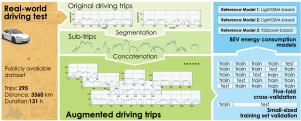Physically rational data augmentation for energy consumption estimation of electric vehicles
Abstract
With the surge of electric vehicles, accurate estimation of their energy consumption becomes increasingly critical. Data-driven models have been widely used for estimating the energy consumption of electric vehicles; however, their applications often face limitations due to inadequate training data, resulting in over-fitting and poor generalizability. In this paper, a physically rational data augmentation approach is proposed to expand the driving trip dataset. By incorporating physical coherence into the augmentation process, new driving trips are synthesized with rational physical context. The effectiveness of the proposed approach is validated by applying it to three data-driven models for estimating the energy consumption of electric vehicles across different validation scenarios. Compared with two baseline data augmentation approaches, our proposed approach demonstrates superior model training performance with less data synthesized. In the best case, the proposed approach achieved a 34% accuracy improvement over the raw data and an 11% improvement over the best-performing baseline. This proposed approach shows considerable promise in facilitating the effective adoption of advanced machine learning algorithms in industrial applications by significantly reducing the data collection requirements.


 求助内容:
求助内容: 应助结果提醒方式:
应助结果提醒方式:


